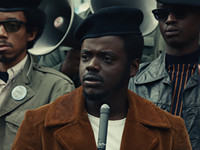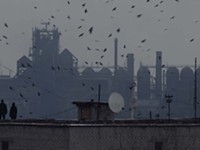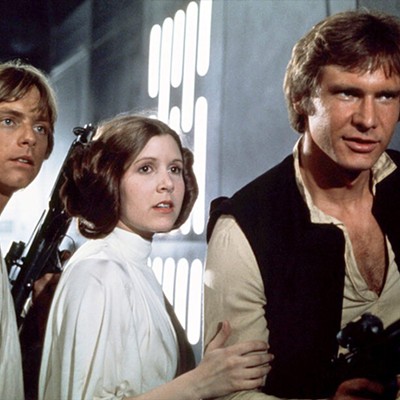[
{
"name": "500x250 Ad",
"insertPoint": "5",
"component": "15667920",
"parentWrapperClass": "",
"requiredCountToDisplay": "1"
}
]
It's a strange coincidence that "Downhill" arrives in theaters the same week Bong Joon-ho's South Korean class satire "Parasite" took home the Academy Award for Best Picture, becoming the first film not in the English language to win that award in the Academy's 92-year history.
In the lead-up to this year's Oscars, there were lots of conversations about how the Motion Picture Academy had demonstrated a reluctance to award international features in the past. Sure, they'd occasionally allow certain titles to break free from Best International Feature (previously Best Foreign Language Film) to compete in the more prominent directing, screenplay, or performance categories. And far less frequently, a foreign language title might have enough crossover appeal to earn a nomination for Best Picture (à la "Amour" or "Roma" last year). But it was always clear those films never had a real shot. Until now.
The success of "Parasite" where so many others had failed is a nice reminder for our culture that cinema isn't a purely American artform, and reinforces the idea that great films can come from anywhere. As Bong Joon-ho remarked upon accepting his Golden Globe for Best Foreign Language Film, "Once you overcome the one-inch tall barrier of subtitles, you will be introduced to so many more amazing films."
The trend of remaking successful international films for English-speaking audiences is nothing new, though it thankfully seems to have grown less common in recent years. It stems from the belief that American audiences won't accept films in other languages. And those movies need to be remade into something more palatable, often less challenging, and (most importantly) without subtitles. So we get films like "Downhill," which exists because of what feels like the result of that outdated way of thinking, despite containing a sharp, funny performance from Julia Louis-Dreyfus.
Directed by Nat Faxon and Jim Rash ("The Way Way Back"), "Downhill" is a remake of Ruben Östlund's 2014 black comedy "Force Majeure." And while Östlund's film was a minor success, it didn't really hit with mainstream American audiences. Which might explain why a clip from the film briefly went viral on Twitter last year, when many commenters confused the footage for a real incident captured by security cameras.
The film maintains the same basic premise as the original film. Billie (Louis-Dreyfus) and her husband Pete (Will Ferrell) are on a ski vacation with their two young sons (Julian Grey and Ammon Jacob Ford) at a luxury resort in the Alps. The trip isn't without its minor hiccups, from the realization that they've inadvertently booked their stay at a less family-friendly location than they'd intended, to the fact that Pete is in a funk, still mourning the loss of his father eight months earlier. But overall, the family's making the best of it.
Then one afternoon while having lunch on the outdoor deck of a restaurant, the family sees one of the resort's periodic controlled avalanches. But as the massive wall of snow rushes right toward the restaurant, it appears that the avalanche isn't so controlled this time. The crowd begins to panic, chaos breaks out, and in a moment of pure animal instinct Pete grabs his phone and runs, leaving his family behind.
Of course, when it turns out everything is fine and -- aside from being covered in a bit of powder -- Billie and the kids are otherwise perfectly safe, Pete is left to sheepishly return to the table, attempting to act as though nothing had happened. His knee jerk reaction isn't without consequence, and the emotional wreckage his response leaves in its wake becomes the film's focus. Suddenly, cracks begin to appear in the seemingly solid foundation of their marriage.
It's a premise ripe for exploration, so an American take isn't necessarily the worst idea, if it could bring some new perspective, or probe the material with the same ruthlessly incisive eye that Östlund brought to the table. But as is often the case with English-language remakes, "Downhill" ends up smoothing out the rough edges of the source material, removing some of the potent ambiguity at the heart of the original's examination of masculinity, family dynamics, and gender roles. More than 30 minutes shorter than "Force Majeure," the new film ends up feeling truncated and streamlined to a detrimental degree.
The script, co-written by "Succession" creator Jesse Armstrong, makes some minor changes, adding in ideas about the envy-inducing nature of social media, as Pete becomes fixated on the documented travels of his co-worker Zach (Zach Woods) and his new girlfriend Rosie (Zoe Chao). The film also gives prominence to Miranda Otto's extraneous character, a thickly-accented Austrian concierge who pops up at inopportune moments to meddle in Billie and Pete's affairs. Her broad comedic performance feels jarringly out of place.
Julia Louis-Dreyfus gives the film's standout performance; she's able to be funny while still finding a grounding in Billie's real emotional hurt. But there's still not enough for her to dig into, and she's never quite matched by her co-star. Farrell's been good in more serious roles in the past, but here he constantly seems on the verge of breaking out into his more familiar comedy shtick.
In the end, "Downhill" isn't a bad film by any stretch. But when "Force Majeure" already exists and is widely accessible, it can't help but feel redundant. You'd be better off seeking out the more effective original than settling for a pale facsimile.
Adam Lubitow is a freelance writer for CITY. Feedback on this article can be directed to [email protected].












